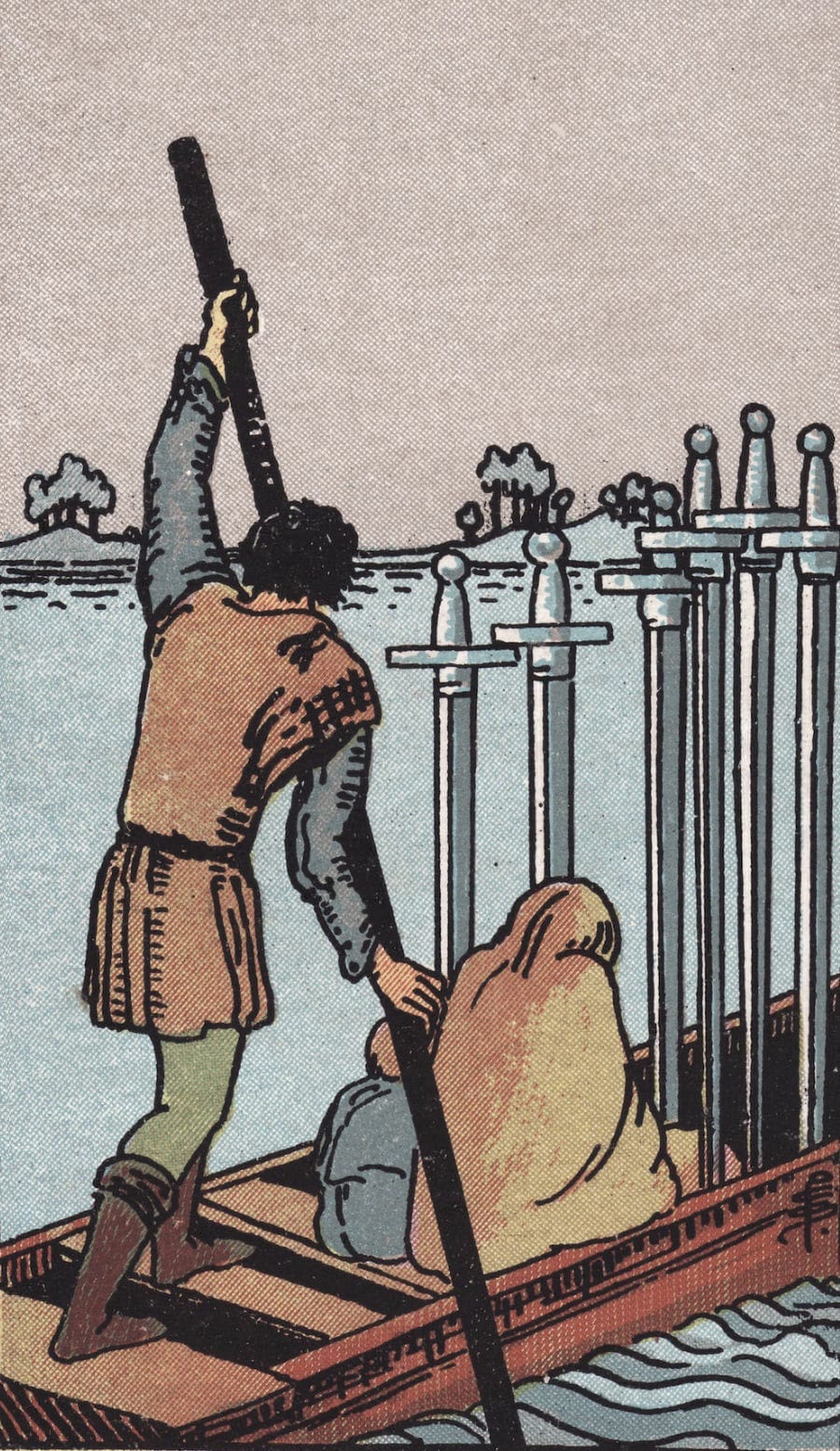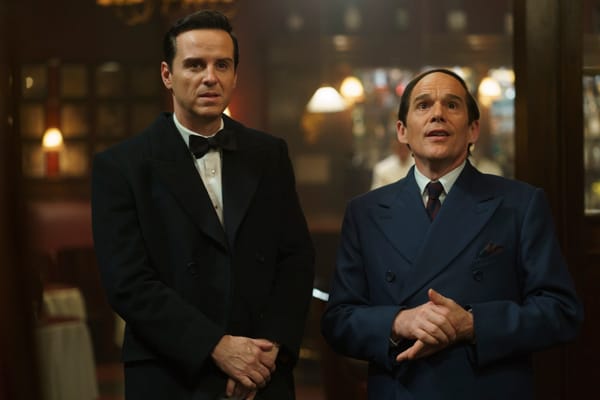Six of Swords
I turned around. There was nothing there.

(This newsletter was written for Jamie Beckenstein’s absolutely wonderful Pop Tarot. Go. Subscribe. Enjoy! It’s seriously so good.)
A few days before Christmas 2017, SpaceX’s Falcon 9 rocket launched from California’s Vandenberg Air Force Base. SpaceX founder Elon Musk was predictably smug about it.
Vandenberg is just north of Santa Barbara, which is just north of Los Angeles, so Angelinos were greeted by the sight of what almost seemed like a hallucination streaking across the darkened sky on one of the shortest nights of the year. What seemed to be a cloud of light billowed out around the rocket, making it look for all the world like a meteor headed up from the Earth and into space, an extinction level event in reverse.
Naturally, people suspected aliens. I live in Los Angeles, and we pride ourselves on being blasé about weird shit, which, of course, meant that when the sky suddenly filled with a localized Oort Cloud, we mostly had to suffer a handful of car accidents. But this is Los Angeles. Those car accidents would have happened anyway.
My favorite card in the entire tarot deck is the humble Six of Swords. In my deck — the lovely Brady Tarot, which reimagines the cards so they all feature animals native to North America — the card is labeled “PASSAGE” and features a great horned owl in flight, the leash and glove of a falconer tied to her foot. From that leash, six arrows dangle. They haven’t hit the owl, who remains in flight, but they are a reminder of the time she was almost struck. For now, she’s moving forward.
In the most famous interpretation of the Six of Swords, six swords block the vision of two huddled figures crouching in a small boat. A boatman rows them slowly across a river, where green trees mark the opposite shore. The figure on the right, cloaked in orange, seems to be hunched forward, as though in mourning. The figure on the left appears to be a child. But there is no way to be sure. They cannot see the green trees. The swords are in their way.
The very first time someone (OK, it was Jamie Beckenstein themselves) offered me a tarot reading, the Six of Swords came up over the course of the spread. Jamie offered an interpretation based on their favorite depiction of the card — a hot air balloon suspended over a river. Behind the balloon, the shore is aflame. But the shore the balloon is headed toward is swathed in darkness. It’s impossible to see what is coming, but what the balloon left behind was impossible to survive.
I love the Six because I live the Six. The idea of constantly being caught between is, of course, a huge trans mood, because “transition” is a lifelong act of faith, a leap off toward something else without quite being aware of what will follow. When I said I was a girl, I was sure I was ruining everything, but once I was up in the sky, I realized the flames that surrounded my old life had nearly consumed me.
The Six has applications beyond generalized transness, however. Being caught “between” is a constant for humans. If one part of your life feels firm and settled, then another surely feels wobbly, like you need to keep moving lest something crumble beneath you. The Six is all about running toward something because the extinction level event is just behind you, but you, for now, are staying ahead of it.
Someone else was watching the skies of Los Angeles in December 2017: singer-songwriter Phoebe Bridgers. The hallucinatory image of the Falcon 9 piercing the sky led her to write the following lyric in “I Know the End,” the mesmerizing closer of her latest album Punisher (and — putting my cards on the table here — one of the best songs ever written):
Big bolts of lightning hanging low
Over the coast, everyone’s convinced
It’s a government drone or alien spaceship
To live in Los Angeles is to be acutely aware that you can drive until the road ends. The 10 freeway will take you west and west and west until it doesn’t anymore, until you find yourself at the edge of the planet’s largest ocean. Look back, and there’s a whole continent that increasingly seems to be on fire. Look ahead, and it’s impossible to see the shore. Intellectually, we know Japan or something is a long way away, but this, too, is a leap of faith. If you started swimming, you’d never get there.
That endless quality makes it fitting that Bridgers situates the strange light in the sky “over the coast,” a place where something should not be. For just a second, the darkness is illuminated, and we have a glimpse of what might lie beyond that uncertainty. Bridgers posits a watchful eye in the sky, whether menacing (a government drone!) or potentially hopeful (an alien spaceship). And yet she’s wrong on both counts. What’s in the sky is capitalism, a rocket that has no real reason to exist beyond providing a tribute to one rich man’s ego.
But if you see a streak across the sky and think, for a moment, that you are not alone, does it matter that Elon Musk was involved?
I grew up believing both shores were knowable. I had emerged from chaos, gotten on a boat through my own life, and could plot my course to the afterlife. I didn’t just know where I would go when I died. I knew what was going to happen in my life, because the end was, while not quite here, definitely near. At one point when I was a child, my mother took me aside and said, with great confidence, that she wasn’t sure if Christ’s return in glory would happen during her lifetime, but she was absolutely sure it would happen within mine.
I spent that childhood reading increasingly alarming reports about how badly humans were botching their shepherding of planet Earth, one of those things God had directly commanded us in the Bible not to screw up. There was still time, my Weekly Reader said every week, to save the world. But this was not the sort of world saving my church or my family was interested in. We did not believe in any actual apocalypses because we had been chosen for a far better one. Forget God’s actual instructions. He’d given us some supplemental ones in an appendix.
When I first began dabbling with tarot and then with witchcraft, I had to overcome an intense inner revulsion that had been drilled into me over years and years and years of fundamentalist Christian upbringing. I didn’t agree with anything I had been taught as a child — I mean, I’m trans, so duh — but I couldn’t escape the dull sense that I was opening some doorway to let demons through and into my life. The degree to which shuffling my tarot deck became my anxiety balm of choice only increased my vague apprehensions. I didn’t really believe the cards were connected to some sort of all-powerful oracle undergirding the universe. Or did I? And was I being much too callous, messing with the proverbial forces beyond my control?
It’s the two lines in Bridgers’s song that follow “government drone or an alien spaceship” that are an absolute triumph of lyric writing, so good that they legitimately make me cry every time. Having set up the otherworldly visitor who turns out to just be a boring billionaire, Bridgers shrugs off the speculation thusly:
Either way, we’re not alone
I'll find a new place to be from
This couplet is, I’m aware, not that amazing on its face, but consider its internal rhyme scheme. “We’re not alone” actually mirrors “government drone” in the previous line, but because our ears want to hear rhymes, and because we know exactly what “I’ll find a new place to…” should lead into, our brains fill in “I’ll find a new place to call home.” “Alone” and “home” don’t exactly rhyme, but close enough, and anyway, we’re primed for another long O sound after “drone” and “alone.”
But Bridgers doesn’t land on “home.” The entire song has been about leaving home to find something new, leaving something on fire for something shrouded in darkness. Home isn’t something you find; it’s something you leave. Instead, she lands on “from,” a word that is so close to rhyming with “alone” without actually doing anything close to rhyming that it jars a little bit. As a writer, I’m agog at how simple but perfect this little shift is. But as someone living out the Six of Swords every single day, I am even more overwhelmed with emotion.
At first blush, the meaning of “new place to be from” seems basically the same as “new place to call home.” And yet the meanings of these two phrases are subtly different. Home is where you were born. You leave it eventually, and you learn that there were things about it that make it impossible to return to, no matter how much you still love it. Life is lived in between, and until you get to the other side of the shore and figure out what’s there, you have to find somewhere to be from.
I do not think Los Angeles is my home. I came here as an adult. I am too aware of its shortcomings, its bland self-regard, its traffic, its air, its tendency to treat a flare in the sky as just another weird thing that happened. But it is where I’m from, a place I’ve adopted as a kind of proxy of the world as I would like to see it. It is a deeply flawed place, but so many of my friends are here, and my work is here, and my cats are here, and the life I have built for myself is here. I had to escape an entire world on fire to make it, but I did.
Saying you are from somewhere is making a declaration of intent. It’s an acknowledgement that you have to plant your flag somewhere in the in between. I want to be from Los Angeles, and so I am.
What I didn’t realize about coming out as trans as an adult was that it wouldn’t mark my future with uncertainty. No, increasingly, I know what my future looks like. Instead, what has been marked with uncertainty is my past.
The longer I am out, and the longer I am on the hormones that have nudged my brain back on the right course, the more stuff I realize I’ve deeply buried thanks to the basic trauma of growing up a trans girl in the middle of nowhere, USA, among fundamentalists who insisted that all you had to do to make it to the happiness of the other shore was to stay on the boat and never even think about looking up to see what was all around you.
My memory, increasingly, feels dubious to me. Moments from my past that I thought I knew well often open up like trap doors to swallow me whole, the tripwires that I cannot see revealed to be things that I had forgotten or convinced myself were fiction. But even when I’m relatively sure of the events of my life, the emotional context will be different.
I remember, for instance, a weekend my freshman year of high school when I decided what I really wanted to do was to hang out with one of the girls in my class. Somehow, I convinced her that we should, and there was this brief sense that we could maybe be good friends. We went shopping together, and I gave her my opinions on outfits she tried on. She told me her dark secrets. I told her mine. It was really fucking nice.
Except everyone around us perceived a teenage boy and a teenage girl and read all of the romantic expectations around that friendship that you might expect from a small town in the middle of nowhere. She stopped wanting to hang out, and teenage me, still thinking he was a boy, was kind of bummed out.
But now I know that I wasn’t just “kind of bummed out.” I was devastated. I felt like I had finally connected to someone, and instead…
My past was taken from me by force. I still don’t quite know how. Yet every step I take into a future I had to claim as my own, I get more of the past too, a silent cloud of light erupting around a single streak in the sky, not the extinction level event I was promised but, rather, its opposite.
No, I'm not afraid to disappear
The billboard said the end is near
I turned around, there was nothing there
Yeah, I guess the end is here
“I Know the End” is probably Phoebe Bridgers’s “Born to Run,” the song she will be playing at concerts for the next 50 years to great acclaim from the crowd. It is one of those songs that feels more perfect for when it was released, in the middle of a pandemic, shining like a beacon illuminating both a past and a future that might be better than this present. But we can’t know yet. We’re not there.
Bridgers introduced the song in her Tiny Desk concert for NPR with “Hope everyone’s enjoying their apocalypse!” (It must be noted how different her earthy speaking voice is from her more ethereal singing voice.) The apocalypse she posits isn’t one of fire but one of erasure. She turned around. There was nothing there.
What I finally realize is that it is not worth being scared of what’s coming. To tell someone that you know where you’ve been, and you know where you’re going, so long as you just stay in the boat, is a form of violence, an act of control so insidious that you don’t realize how hemmed in you are by swords all around. The people I grew up with wanted me trapped on that boat, because they were trapped too and could not imagine any other way across the river.
So, instead, let me suggest something else. Let me suggest that we never know what’s ahead of us, and we don’t always know what’s behind us either. But we know there is a river and as many ways to cross it as there are travelers.
—10/6/2020




